Holocaust survivor shares her story
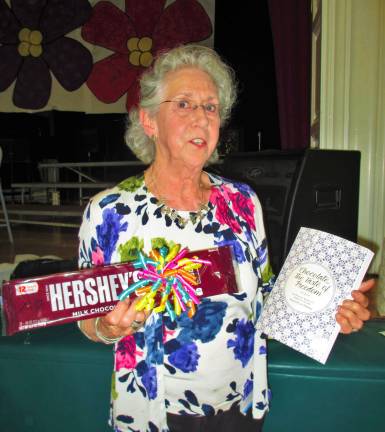
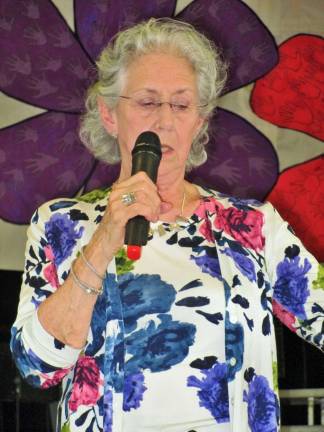
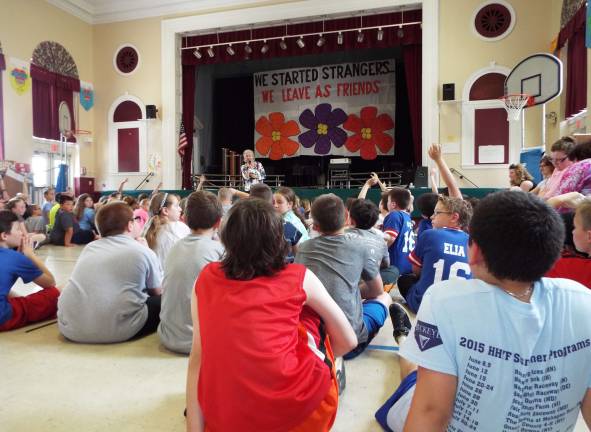
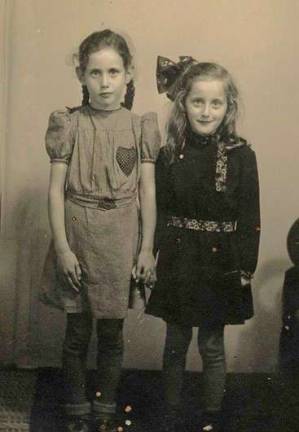
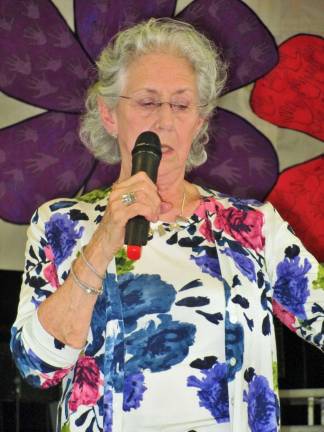
WANTAGE — “It all started in 1940 when our homeland was invaded. ‘This is not a vacation,’ is what I was told. ‘Remember that.’”
This past Friday, May 27,, Maud Dahme of Flemington, N.J., presented at the Wantage Elementary School to reach out to students learning about the European Holocaust.
Jewish-born in 1936 in Amersfoort, a municipality of the province Utrecht in the Netherlands, Dahme — last name Peper, at the time — and her sister Rita were put into the care of Christian strangers under the guise of nieces with the names “Margie” and “Rika” “Spronk.”
Separated from their parents — Hartog and Lilly Peper — in the summer of 1942, six-and-a-half-year-old Dahme and her four-year-old sister were taken to a farm in Oldebroek, another Netherlands municipality, and later to a fishing village called Elburg where they would remain hidden with the Westerink family for the next three years.
“You grow up very fast looking after a little sister with no parents,” Dahme said. “It’s important for children to hear my story so they learn respect for each other.”
Dahme announced the recent (2015) publication of her first memoir Chocolate, The Taste of Freedom, co-written and edited with Assistant Director of the Sara & Sam Schoffer Holocaust Resource Center and Stockton University Professor Dr. Maryann McLoughlin.
Geared towards young adults, the book is available for purchase through ComteQ Publishing and accounts Dahme’s wartime experiences, immigration to the United States, and more recent Holocaust education advocacy.
Former governor Thomas Kean says Chocolate is the story of “those who at the risk of their own lives decided that evil must not triumph.” He also says, “It is the story of a gentle and courageous woman who emerged from… desperation… to become a leader.”
During the three years in hiding, Dahme explains she could not attend school. By Christmas of 1944 known as the Winter of Hunger, more than 20,000 Dutch-born people perished from starvation.
“While we lived in Elburg, we ate eel for breakfast, lunch and dinner,” she said. “We even roasted bugs to eat. We had no birthdays, toys or candies. One time, the village slaughtered a pig. My sister and I dreamt of turning the beast’s bladder into a ball to play with.”
Liberated April 19, 1945, by Canadian officers, Dahme says, “The men in the blue coveralls that came into the village first were Dutch resistance fighters. They knew the village was safe and gave the Canadians the honor of initiating emancipation. This is when I was fed chocolate for the first time… I’ve been a lover of it ever since.”
Dahme’s parents survived remaining hidden in the attic of a car dealership. Reunited shortly after, the Pepers learned their children had been playing with live grenades, unaware of the danger involved.
The family immigrated to the U.S. in 1950 when Dahme was 14-years-old. Her remaining relatives, she later discovered, had been taken to death camps and killed early in the war. Dahme later married Hank Dahme (deceased since 2001) in 1957 and has four children with nine grandchildren. She is 80 years old this year.
In 2014 in the Netherlands, Jo Frederica von Gulik-Westerink and her parents Jacob and Henriette Westerink were honored as “Righteous Among the Nations” at Yad Vashem, Israel’s World Holocaust Remembrance Center.
The Spronks, too, have also been honored in the Netherlands.
Dahme never attended college but was awarded an honorary Doctorate of Law from St. Elizabeth College for her advocacy. The 2006 P.B.S. documentary “The Hidden Child” chronicles her life as one of an estimated 5,000 Jewish children taken into hiding during WWII.
In 2014, Dahme was inducted into the New Jersey Hall of Fame as one of the state’s “Unsung Heroes.” A month ago, she returned from Poland where she travels each spring for the March of the Living, an annual two week-long event following Passover in memory of the Holocaust.
Each summer, she leads a tour for educators organized by the N.J. Commission on Holocaust Education of sites in Europe. This summer, Dahme will lead 35 teachers on a 15-day trip. She is also a member of the New Jersey State Board of Education and has served as Vice-President and President in the past.
After the presentation, Dahme concluded with an excerpt from Shane Derolf’s 1997 poem, “The Crayon Box That Talked” to stress the importance of diversity.
Wantage School educator Christine Williams arranged the event.